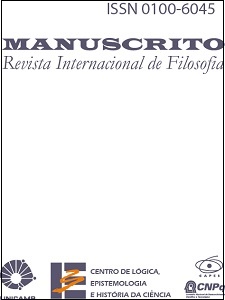Resumen
A principal aim of Chateaubriand’s Logical Forms II: Logic, Language, and Knowledge is to clarify and defend what Chateaubriand describes as the ontological conception of logic against the standard model-theoretic or “linguistic” view. Both sides to the debate accept that if logic is a science then there must be logically necessary facts that this science discovers, Chateaubriand arguing that because logic is a science, there must be logically necessary facts, and his opponent that because there are no logically necessary facts, logic cannot be a science. I argue that we can go between the horns of this dilemma by showing that, although logic is a science, it does not follow, as Chateaubriand assumes, that there are logically necessary facts. There are truths of (the science of) logic; there are no “logical truths”.
Resumo: Um dos objetivos principais de Logical Forms II: Logic, Language and Knowledge de Chateaubriand é clarificar e defender o que ele descreve como a concepção ontológica da lógica, contra a visão predominante, modelo-teórica ou “lingüística”. Os dois lados do debate aceitam que, se a lógica é uma ciência, então deve haver fatos logicamente necessários que esta ciência descobre; Chateaubriand argumenta que, porque a lógica é ciência, deve haver fatos necessários que ela descobre, enquanto seus oponentes argumentam que, porque não há fatos logicamente necessários, a lógica não pode ser uma ciência. Eu argumento que podemos tomar uma via intermediária entre estes dois lados do dilema mostrando que, ainda que a lógica seja uma ciência, não se segue, como Chateaubriand assume, que existem fatos logicamente necessários. Existem verdades da (ciência da) lógica; não existem “verdades lógicas”.
Palavras chave: Chateaubriand. Frege. Permissão para inferência. Verdade lógica. Intuição matemática. Peirce.
Citas
BENACERRAF, P., PUTNAM, H. (eds.). Philosophy of Mathematics: Selected Readings, 2nd edition. London/New York: Cambridge University Press, 1983.
BLACK, M. (ed.). Philosophical Analysis: A Collection of Essays. Ithaca, NY: Cornell University Press, 1950.
CARROLL, L. “What the Tortoise Said to Achilles”. Mind, 4, pp. 278-280, 1895.
CHATEAUBRIAND, O. Logical Forms. Part I: Truth and Descriptions. Campinas: Unicamp, Centro de Lógica, Epistemologia e História da Ciência, 2001. (Coleção CLE, v. 34) –———. Logical Forms. Part II: Logic, Language, and Knowledge. Campinas: Unicamp, Centro de Lógica, Epistemologia e História da Ciência, 2005. (Coleção CLE, v. 42) FREGE, G. The Basic Laws of Arithmetic: Exposition of the System. Translated by M. Furth. Berkeley/Los Angeles: University of California Press, 1964.
GÖDEL, K. “What is Cantor’s Continuum Problem?”. Repr. in P. Benacerraf and H. Putnam (1983), pp. 483-484.
HARDY, G. A. “Mathematical Proof”. Mind, 38, pp. 1-25, 1929.
MACBETH, D. Frege’s Logic. Cambridge, Mass.: Harvard University Press, 2005.
MACBETH, D. “Pragmatism and Objective Truth”. In: C. Misak (ed.) (2007), pp. 169-192.
MISAK, C. (ed.). New Pragmatists. Oxford: Clarendon Press, 2007.
PEIRCE, C.S. Collected Papers of Charles Sanders Peirce, v. III. Edited by C. Hartshorne, P. Weiss, and A. Burke. Cambridge, Mass.: Harvard University Press, 1931.
MACBETH, D. Reasoning and the Logic of Things: The Cambridge Conference Lectures of 1898. Edited by K.L. Ketner and with an introduction by K.L. Ketner and H. Putnam. Cambridge, Mass.: Harvard University Press, 1992.
QUINE, W.V. “Two Dogmas of Empiricism” [1951]. Repr. in From a Logical Point of View. Cambridge, Mass.: Harvard University Press, 1953. (Second edition in 1961) RYLE, G. “‘If’, ‘So’, and ‘Because’”. In: M. Black (ed.) (1950), pp. 323-340.
VAN HEIJENOORT, J. “Logic as Calculus and Logic as Language”. Synthese, 17, pp. 324-330, 1967.


